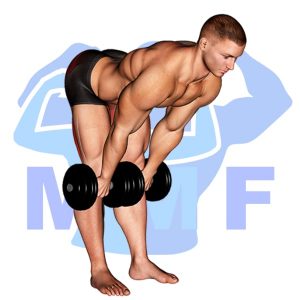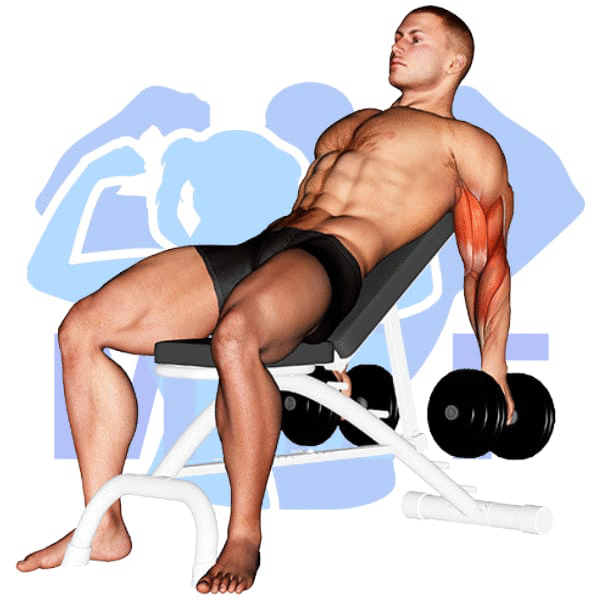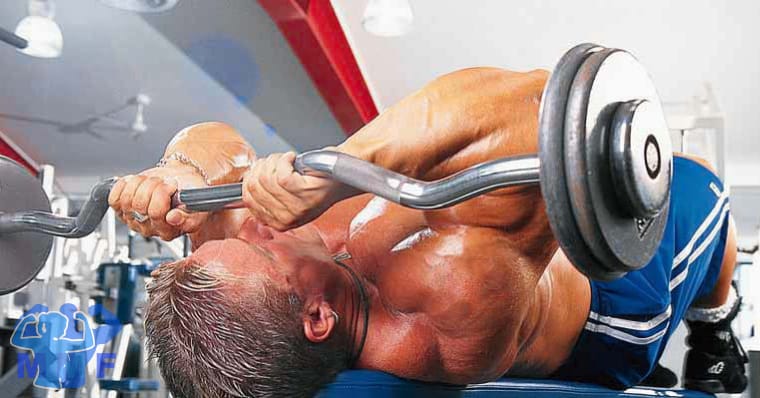Are you struggling to strengthen your hamstrings using traditional exercises like squats or deadlifts? Do you feel like you’ve hit a plateau and can’t seem to make any progress? It’s not uncommon. Many people face this issue. One of the reasons for this is that they are not utilizing the right exercises to target their hamstrings effectively. Fortunately, in this post, we have a solution for you – the lever lying leg curl. Learn how this exercise can help you build strong, defined hamstrings and improve your overall lower body strength.
Lever Lying Leg Curl (Machine) Summary
- Primary Muscles: Hamstrings
- Secondary Muscles: Gracilis, Popliteus, Sartorius, and Tensor Fasciae Latae
- Equipment: Lying Leg Curl Machine
- Mechanics Type: Isolated
- Force: Pull
- Utility: Basic

Lever Lying Leg Curl (Machine) Instructions
- Lie on your back on the lever machine.
- Position your legs under the pad and secure them with the lever.
- Flex your knees, raising the pad and curling your legs.
- Hold for a few seconds, then slowly lower the pad back to the starting position.
- Repeat for desired number of repetitions.
Video Tutorial
Lever Lying Leg Curl (Machine) Muscles
Target (Agonist)
Synergists
- Gracilis
- Popliteus
- Sartorius
- Tensor Fasciae Latae
Dynamic Stabilizers
- Rectus Femoris
Stabilizers
Antagonist Stabilizers
- Tibialis Anterior

Benefits of Lever Lying Leg Curl (Machine)
The Lever Lying Leg Curl (Machine) exercise is an effective way to target the hamstring muscles. This exercise involves lying on a machine with the knees bent and feet placed securely on a lever. By pushing the lever down with the feet, the hamstring muscles are engaged and strengthened. The Lever Lying Leg Curl (Machine) is an excellent exercise for those looking to develop strength and size in the hamstrings as it allows for more control over the movement and muscle isolation. Additionally, this exercise can help improve balance, stability, coordination, and posture.
Tips for Performing Lever Lying Leg Curl (Machine)
This exercise is a great way to strengthen and tone your hamstrings, and with these simple tips, you can get the most out of your Lever Lying Leg Curl. These tips will help you target the right muscles, while avoiding injury and getting the maximum benefit from your workouts. So, let’s get started!
- Ensure proper form: When performing the Lever Lying Leg Curl exercise, it is important to keep your body in a straight line and keep your back flat to the bench, as well as keeping your feet pointed straight and your heels close to the pad.
- Increase resistance: To increase the difficulty of the exercise, increase the weight on the lever, which will help build strength and muscle.
- Perform the exercise slowly: To maximize the results from the Lever Lying Leg Curl, it is important to perform each repetition slowly and with control, focusing on contracting your hamstrings throughout the entire range of motion.
Benefits and Tips Video
Frequent Mistakes To Avoid
It is important to remember that proper form is key for any exercise and the Lever Lying Leg Curl is no exception. To ensure you get the most out of the exercise, it is important to avoid the following mistakes that can lead to injury or strain.
- Not maintaining a neutral spine: Keeping your back pressed firmly into the bench throughout the exercise is essential for engaging the hamstrings and protecting your spine. Allowing your back to arch off the bench can increase your risk of injury and reduce the effectiveness of the exercise.
- Not controlling the eccentric portion: The eccentric portion of the exercise (lowering the weight) should be done slowly and with control. This allows you to use a heavier weight and also helps protect your joints from injury.
- Relying solely on momentum: While it can be tempting to use momentum to complete the exercise, this will reduce the effectiveness of the exercise and potentially cause injury. Instead, focus on using slow and controlled movements to ensure you are working your hamstrings correctly.
Find More Machine Exercises Here
Variations and Complementary Exercises
There are many variations, complementary, and alternative exercises that can be done in place of or in addition to the Lever Lying Leg Curl (Machine). These exercises all work similar muscles and can be used to add variety to your workouts and challenge your muscles in different ways. Below is a list of some of the most popular exercises that can be used as alternatives to the Lever Lying Leg Curl (Machine).
Cable Leg Curl

The Cable Leg Curl is a great complementary or alternative exercise to the Lever Lying Leg Curl (Machine). This exercise can be performed either standing or sitting, and it involves using a cable machine with an ankle cuff to curl your legs up towards your glutes. The Cable Leg Curl primarily works the hamstrings, but also strengthens your glutes and calves. It is a great alternative to the Lever Lying Leg Curl (Machine) as it requires no weights and can be done in different variations to target different areas. Additionally, it is a much more dynamic movement than the Lever Lying Leg Curl (Machine) and can help to increase mobility, flexibility, and balance.
Dumbbell Straight Leg Deadlift

The Dumbbell Straight Leg Deadlift is a great complement or alternative to the Lever Lying Leg Curl (Machine). It is an effective exercise for strengthening the lower body muscles such as the glutes, hamstrings, and calves. It also helps to improve balance, coordination and flexibility. The movement involves keeping the legs straight as you bend over and pick up the dumbbells. The hips should be pushed backwards while keeping the back straight and engaging the core muscles. The motion should be slow and controlled as you lift and lower the weight. This exercise helps to target the same muscles as the Lever Lying Leg Curl but with a different range of motion.
Dumbbell Stiff Leg Deadlift

The Dumbbell Stiff Leg Deadlift is a great complementary or alternative exercise to the Lever Lying Leg Curl (Machine). This exercise works the hamstring muscles, glutes, and lower back in a slightly different way than the Lever Lying Leg Curl. When performing a Dumbbell Stiff Leg Deadlift, the hips should stay slightly bent while keeping the lower back straight. The focus should be on using the hamstrings to pull the weight up and keeping the glutes and core engaged throughout the entire movement. This exercise is an excellent way to increase hamstring strength and can be used as an effective alternative or complement to the Lever Lying Leg Curl.
Check Out These Top Machine Exercises
Smith Machine Deadlift

The Smith Machine Deadlift is a great complementary or alternative exercise to the Lever Lying Leg Curl (Machine). It allows you to work the same muscles in the legs, but also challenges your core, back and glutes. By performing the deadlift with a Smith Machine, you are able to maintain a consistent and stable form throughout the entire exercise. This exercise also allows you to lift heavier weights, so you can really challenge yourself and build strength. The Smith Machine Deadlift is a great exercise for targeting the same muscles as the Lever Lying Leg Curl, but with a slightly different approach.
Band Stiff Leg Deadlift

The Band Stiff Leg Deadlift is a complementary exercise for the Lever Lying Leg Curl (Machine). It works the same muscles in a different way, as it requires the user to lift the weight off the ground, rather than curling it. This exercise helps to build strength and stability in the lower body, while also engaging the core and upper body muscles. It is an alternative to the Lever Lying Leg Curl (Machine) as it works the same muscles but without the use of machines or weights. It can be done with just a band and can be tailored to the user’s fitness level. This makes it a great alternative for those who do not have access to gym equipment or don’t want to use machines.
Find More Legs Exercises Here
Opposing Complementary Exercises
By working the opposite muscles, you can help create balance in your body. Here are some exercises that target the opposite muscles of the Lever Lying Leg Curl (Machine):
Lever Leg Extension (Machine)

The Lever Leg Extension (Machine) is a great complement to the Lever Lying Leg Curl (Machine) as it works the opposing muscle group. The Lever Leg Extension (Machine) works the quadriceps, which are the muscles on the front of the thighs, while the Lever Lying Leg Curl (Machine) works the hamstrings, which are on the back of the thighs. By performing both of these exercises in combination, you will ensure that both your quadriceps and hamstrings are getting an effective workout. This can help to improve overall balance and strength in the lower body.
Barbell One Leg Squat

Barbell One Leg Squat is an excellent exercise to complement the Lever Lying Leg Curl (Machine). This exercise targets the quads and glutes, which are the opposing muscle group to the hamstrings targeted in the Lever Lying Leg Curl. Barbell One Leg Squat works the quads, glutes, and core muscles as you balance on one leg while squatting down with the barbell. This exercise is also great for developing balance and coordination. By pairing these two exercises together, you are able to target both the front and back of the legs, which makes for a complete workout.
Split Squat

The split squat is a great complement to the lever lying leg curl machine exercise, as it works the opposing muscle groups. The split squat focuses on the quadriceps muscles and the gluteus maximus, while the lever lying leg curl primarily targets the hamstrings and gluteus maximus. By performing both exercises together, you can create balance in the lower body, improving overall strength and mobility.
Build Stronger Hamstrings with Lever Lying Leg Curls
Building strong hamstrings is crucial for overall leg strength and injury prevention. One effective exercise for targeting the hamstrings is the lever lying leg curl. This exercise allows for controlled movements and can be adjusted for different levels of resistance. When performing this exercise, it is important to maintain proper form and avoid jerky or rapid movements, which can put unnecessary strain on the knee joint. With consistent practice, incorporating lever lying leg curls into your workout routine can help improve your hamstring strength and enhance your overall lower body fitness.
References: Wikipedia | ExRx.net | PubMed.gov | Comprehensive List of Legs Machine Exercises




